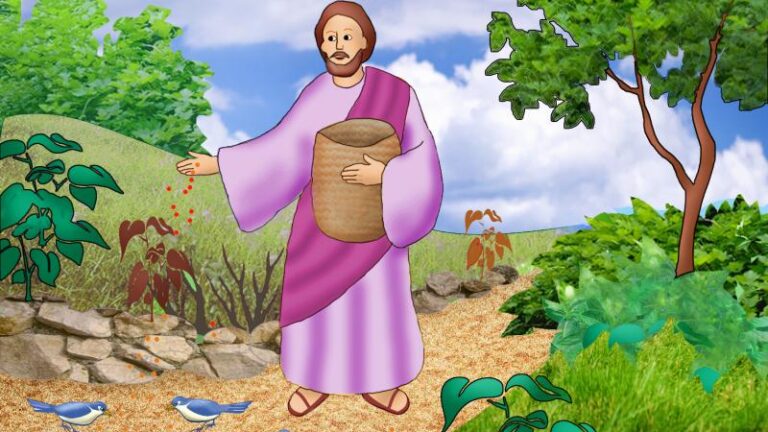First Reading: Isaiah 55:10-11
Responsorial Psalm: Ps. 64(65):10-14
Second Reading: Romans 8:18-23
Gospel Reading: Matthew 13:1-23
_______________________________________
In the First Reading, we learn of the efficaciousness of God’s Word which does not return to Him empty. But how come does the Word of God not carry-out Its purpose in the lives of some people when they listen to it? Does this nullify this prophecy of Isaiah?
Ans: Inasmuch as the Word of God is efficacious; it also requires the cooperation of the recipient in order to accomplish its goal. Needless to say, the disposition of the heart that receives the Word of God is a prerequisite for God’s Word to be effective; just as the rain that waters the earth and makes what is sown therein to sprout is dependent on the nature and type of soil. Therefore, the prophecy of Isaiah is not nullified when the Word of God does not achieve its purpose in the lives of some people because “He who created us without our help will not save us without our consent.” Therefore, God could give more time for the sinner to embrace repentance in order that the purpose of His Word is achieved.
What part of Isaiah is the prophecy (in the first reading) taken from? What is the name of that part of the book, and what context was Isaiah trying to address?
The book of the Prophet Isaiah is divided into three parts and written at different epoch, viz: Proto-Isaiah (chapters 1-39), Deutero-Isaiah (chapters 40-55), and Trito-Isaiah (chapters 56-66). Now, the prophecy stated in this Sunday’s first reading (Isaiah 55:10-11) falls under “Deutero-Isaiah,” that is, the second book of Isaiah, known as the “Book of Consolation.” It was contextually written for the exiles who would return from Babylon to Judah, the chapters are meant to comfort the dispirited people. There are promises of fertile land and restoration, water for the thirsty, and secure defence against enemies as the result of Yahweh’s power, and mercy. What Isaiah means is that, like rain and snow which water the earth so that seeds may sprout and grow, God’s word will accomplish its purpose, in this case, to return the exiles to their homes in peace. Their return will be an everlasting memorial to the power of Yahweh’s word. Thus, today’s passage promises spiritual fertility. It implies that God will make the peoples’ religious lives fruitful, as He has done for their land. And it could bespeak a promise that God will make fruitful the work of the prophet, whose job it is to proclaim God’s word.
Today’s psalm is said to be fulfilled in the person of Christ. How does Jesus fulfil the prophecy of in today’s Psalm?
The Psalm briefly talks about God’s care for the earth, giving it water and filling it with riches and providing its grain. In the person of ‘Jesus, God’s Word has visited our land, to water the stony earth of our hearts with the living waters of the Spirit (see John 7:38; Revelation 22:1).’ – Scott Hahn
What are the first–fruits of the Spirit talked about by St. Paul in the Second Reading?
Generally, the fruits of the Spirit are charity, joy, peace, patience, kindness, goodness, generosity, gentleness, faithfulness, modesty, self-control, chastity. However, in the context of the reading and its application, the first-fruits of the Spirit talked about is love and adoption poured into our hearts in Baptism, making us children of God, as Paul reminds us in the Epistle (see also Romans 5:5; 8:15–16). Therefore, possessing these first-fruits, we are to patiently wait until we reap the fruits in the kingdom of heaven when ‘our bodies would be set free,’ because “what we suffer in this life can never be compared to the glory, as yet unrevealed, which is waiting for us…” as Paul explains in the Second Reading.
Having understood God’s Word as the seeds that are sown in our hearts, what is the relationship between the Holy Eucharist and the Word that is sown into our hearts?
The Holy Eucharist we receive at Mass prepares and makes fertile our hearts in being receptive to the seeds of God’s Word sown therein during the liturgy of the Word. Therefore, without the Holy Eucharist, our hearts cannot be fertile and we cannot bear fruits.
Above all, this parable reminds us of the liturgical time we are presently in the Church – the Ordinary Time of the Church’s Year. This is not merely “ordinary” as the term appears, but a time that offers us an ample opportunity to grow spiritually and bear fruits. That is why the colour of this liturgical time is green, indicating the healthy state of growing plants (green). As we grow in this period, may the good Lord continually fill us with His graces in order to be always disposed to receive His Word and reap a rich harvest at the end of time. Amen.
Shalom!
© Fr. Chinaka Justin Mbaeri, OSJ
Paroquia Nossa Senhora de Fatima, Vila Sabrina, São Paulo, Brazil
nozickcjoe@gmail.com / fadacjay@gmail.com




